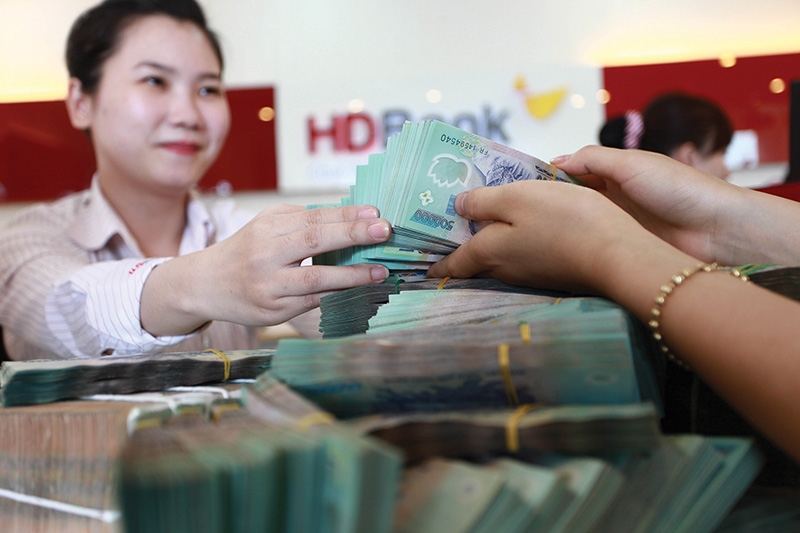Margin loans to securities firms on rise
 |
| Margin loans are taking off, with banks sponsoring securities firms, photo Le toan |
A variety of stimulative efforts by the Vietnamese government to support the domestic economy has consequently created a springboard for stocks to surge. The fear of missing out has also pushed many local and foreign banks to allocate more funds into brokerages under the so-called margin loans, thus giving investors greater buying power.
The financial statements of 25 securities firms with large outstanding loan balances to customers showed that as of the end of 2020, their total debts reached VND84.97 trillion ($3.66 billion), an increase of 48.9 per cent against the beginning of the year and up 24.9 per cent against the third quarter of 2020. Meanwhile, short-term loans from banks were VND76.85 trillion ($3.31 billion), up 65 per cent against the beginning of this year and 28.6 per cent compared with three months earlier.
However, the closing term loan balance only reflects a part of the capital channel flowing into the securities industry in 2020. Securities firms have increased their loans during the period and paid the debt at the end to lower the balance.
A staggering 20 out of 25 securities firms have borrowed short-term loans from banks up to VND461.467 trillion ($20 billion), six times higher than the short-term loan balance at the end of the period. Meanwhile, domestic banks remain the main funding sponsors for securities firms, including those dominated by foreign financial groups.
According to company reports, Vietcombank is the leading capital backer for the stock market, with a rising amount of over VND27.51 trillion (over $1 billion) in 2020 or about five times the bank’s short-term loan balance for such companies.
Some securities firms that are backed by Vietcombank are SSI Securities Corporation (SSI) with VND17.35 trillion dong ($747.42 million), KB Securities Vietnam JSC (KBSV) at VND6.88 trillion ($296.29 million), ACB Securities Co., Ltd. (ACBS) at VND1.35 trillion ($58.14 million), and MB Securities JSC (MBS) at VND1.23 trillion ($52.97 million).
Trailing behind Vietcombank is BIDV with a loan amount of more than VND21.2 trillion ($914.11 million), four times higher than the short-term loan balance at the end of the period. BIDV offers large loans to SSI at VND14.1 trillion ($607.75 million), KBSV at VND1.829 trillion ($78.84 million), KIS Vietnam Securities Corporation (KIS) at VND1.827 trillion ($78.75 million), and Phu Hung Securities Corporation (PHS) at VND3.21 trillion ($137.93 million).
Vietnam Maritime Joint Stock Commercial Bank (MSB) had provided loans of VND6.08 trillion ($262 million) to securities companies, mainly KBSV and MBS. Meanwhile, VPBank had backed VND5.14 trillion ($221.51 million) of loans to KBSV, MBS, Techcom Securities JSC (TCBS), and ACBS.
In addition, Saigon-Hanoi Commercial Joint Stock Bank has sponsored Saigon-Hanoi Securities JSC. Vietnam International Commercial Joint Stock Bank and Tien Phong Commercial Joint Stock Bank also poured more capital into securities companies last year.
Some foreign financial institutions such as Wooribank, CTBC, Indovinabank, and Shinhan Bank Vietnam have actively backed securities firms in 2020. Wooribank had lent more than VND2.81 trillion ($121.16 million) to KIS, MBS, ACBS, and KBSV. Indovinabank has issued loans to securities firms such as MBS, KBSV, and TCBS.
Meanwhile, Vietnamese financial institutions are the main capital backers for securities firms, including those with large foreign investments and ratios from 50 to 90 per cent. For KBSV, up to 90 per cent of its loan value came from domestic banks. Meanwhile, this figure sits between 60 and 80 per cent for MBS, ACBS, PHS, and FPT Securities JSC.
Nguyen Tuan Anh, director of the Credit Department under the State Bank of Vietnam revealed that the floundering economy and soaring stock market have brought about a sharp increase in credit for stock trading, especially in the last two months of 2020. By the end of December, credit for the securities sector reached VND45.784 trillion (nearly $2 billion), up 49.37 per cent on-year. The figure, however, only accounted for a very modest proportion (0.5 per cent) in the total outstanding loans of the economy.
Anh emphasised that abundant resources have enabled banks to boost their loans to brokerages through sponsoring these companies to trade government bonds.
Tran Khanh Hien, head of the Analysis Division at VNDIRECT Securities believed that the current risk management of the banking system and brokerage have been much improved.
According to Circular No.36/2014/TT-NHNN, the total outstanding credit that commercial banks and branches of foreign banks extend to clients for stock investments and business is not allowed to exceed 5 per cent of the charter and allocated capital of commercial banks and foreign branches. “Moreover, investors are also aware of financial leverage-related risks, so the bad debt ratio arising from securities loans is relatively low,” Hien said.
What the stars mean:
★ Poor ★ ★ Promising ★★★ Good ★★★★ Very good ★★★★★ Exceptional
Related Contents
Latest News
More News
- Raised ties reaffirm strategic trust (February 20, 2026 | 14:06)
- Sustained growth can translate into income gains (February 19, 2026 | 18:55)
- The vision to maintain a stable monetary policy (February 19, 2026 | 08:50)
- Banking sector faces data governance hurdles in AI transition (February 19, 2026 | 08:00)
- AI leading to shift in banking roles (February 18, 2026 | 19:54)
- Digital banking enters season of transformation (February 16, 2026 | 09:00)
- IFC to grant $150 million loan package for VPBank (February 13, 2026 | 09:00)
- Nam A Bank forms position as strategic member at VIFC through three key partnerships (February 12, 2026 | 16:39)
- Banks bolster risk buffers to safeguard asset quality amid credit expansion (February 12, 2026 | 11:00)
- VNPAY and NAPAS deepen cooperation on digital payments (February 11, 2026 | 18:21)

 Tag:
Tag:



















 Mobile Version
Mobile Version